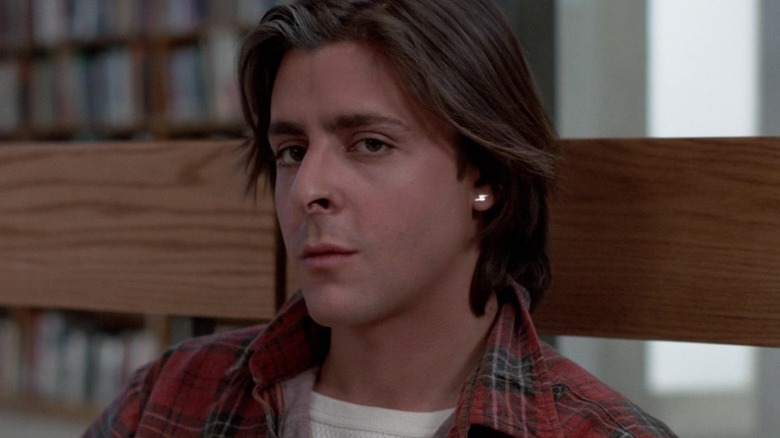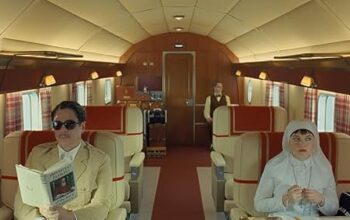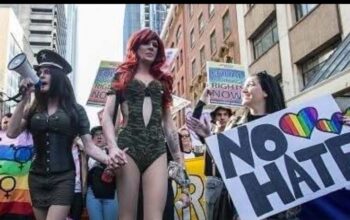‘The Breakfast Club’ is an 80s classic, a high-school drama attempting to appeal to everybody, bridging the gap between cliques and showing that there isn’t that much difference between the people you meet. Everyone has their own strengths as well as their own vulnerabilities, their own confidences and insecurities. But for such a film that pushes a message of acceptance and social equality, it seems to push one character before all others: John Bender.
Everyone knew a kid like Bender in school, a guy who seemingly made his day by ruining everyone else’s. Life would never work out as well as it would in a John Hughes film. Whenever I’ve come across a fairy-tale ending like the one in ‘Breakfast Club’ I would always come to the same conclusion: It’s unreliable narration. As such, I propose that Bender is the protagonist and narrator, projecting his experiences onto other students to combat his cruel life experiences.
My re-telling
Bender arrives at school for detention, imagines the most prominent students of each clique in there with him and insults Vernon like normal. After the highly quotable “eat my shorts” argument, Bender sneaks out to grab and hide his weed before Vernon escorts him back to the classroom. Bender blazes up, but Vernon either smells the smoke, or hears the fire alarm sound, catching him and locking him in the storeroom. The rest of the story, including each student opening up about themselves, Bender getting the girl and strolling off into the sunset, is part of his imagination as the marijuana stimulates his mind. The film is a desperate fantasy that he might gain and sustain a healthy relationship.
We only follow Bender
Bender is the protagonist; he is the driving force that leads us from scene-to-scene. Bender antagonises Vernon, gets the weed, Claire’s heart, and locked in the storeroom. The rest of the group either follow Bender or Vernon, rarely making any decisions of their own. From the arrival of Vernon, it’s clear the others are set on serving their time and getting out as soon as possible, Andrew especially. “Look, you guys keep up your talking and Vernon’s gonna come right in here. I got a meet this Saturday and I’m not gonna miss it on account of you boneheads.” I posit that Brian, Andrew, Alison and Claire are only observers of the story, the Nick Carraway to John “Gatsby” Bender.
While some non-protagonist characters in fiction can be narrators (Like Nick in ‘Gatsby’), the film very rarely places its focus away from Bender. The only couple of non-Judd Nelson scenes we’re treated to are 10 second to minute-and-a-half-long cutaways to Vernon, the first interaction between Andrew and Alison and when Alison finally starts to open up. The latter two, I propose to be part of Bender’s fantasy, background scenes to support his dependence on the possibility of connection.
Bender projects his issues to feel less alone
Despite the 5 students being from 5 very different cliques, it seems that Bender faces everyone’s social problems. In the second half of the film, the group get high on Bender’s weed and start to open up to one another, culminating in a heavy, emotional discussion. Brian contemplated suicide because of academic pressures, Andrew suffers from toxic masculinity to impress his father, Alison has no social connection whatsoever and Claire is under constant peer pressure. It’s revealed in the first half that Bender suffers from parental pressure like Brian and Andrew when he imitates his father. “Stupid, worthless, no good, goddamn, freeloading son of a bitch! Retarded, big mouth, know-it-all, asshole-jerk!”. His problems with peer pressure can be assumed from his hostile response to Claire’s speech on Bender’s supposed hypocrisy, arguing that Bender would shun the group on any other day. “Don’t you ever talk about my friends! You don’t know any of my friends, you don’t look at any of my friends, and you certainly wouldn’t condescend to speak to any of my friends!” While Bender doesn’t share Alison’s issue, Brian arguably does, as shown when he asks whether Alison would shun him to her friends. “Would you do that to me?” “I don’t have any friends….I don’t think the friends I’d have would mind.” All of the problems presented are interchangeable with most of the main characters, except one: Bender’s.
It’s clear that each teenager has their own harmful relationship with their parent, but Bender’s parents are the only ones who are revealed to domestically abuse him. After Bender imitates one of his father’s verbal tirades, Andrew begs to differ, and in response, Bender rolls up his sleeve and reveals a scar. “It’s about the size of a cigar. Do I stutter?” This one minute of film easily establishes Bender as a standout character with a running theme of physical abuse. This is reinforced when Vernon encourages him to assault him, then raises his own fist to threaten. Bender having arguably the darkest plotline of the film makes the idea of the club being a desperate figment of his imagination extremely believable to me. Going through High School when both your parents and your Principal threaten you with violence, feeling as if you’re the only one with an experience like that would push anyone to fantasy.
Conclusion
With Bender commanding the role of protagonist and orchestrating almost every plotline, as well as possessing the most disturbing backstory of the group, I find it completely plausible that the John Hughes high school fantasy we fell in love with is Bender’s own. Is it really more bizarre than everyone following the most hated guy in school and agreeing to get high with him? Is it more believable that Bender successfully romances the woman whose legs he slid his head between? When you’re the victim of physical abuse, wouldn’t it be easier to imagine you have a group of friends as equally damaged as you?
I’m not here to change anyone’s mind or act like I was with John Hughes when he wrote the film; this is just a theory I had to share. As a reviewer, I believe one of my most important duties is pushing alternative thinking to movies. I believe that if a film is “bad” it’s simply because I haven’t come around to the director’s way of thinking, and then attempt to put myself in the director’s perspective. Because of that, I can’t help but hypothesise new endings. Maybe Al Pacino is Colin Farrell’s long-lost father (‘The Recruit’), maybe the romance with James Spader is all in Maggie Gyllenhaal’s mind (‘Secretary’), maybe ‘The Breakfast Club’ really ends with Vernon expelling Bender for marijuana possession. “Maybe” opens up many more doors than the original film could.




